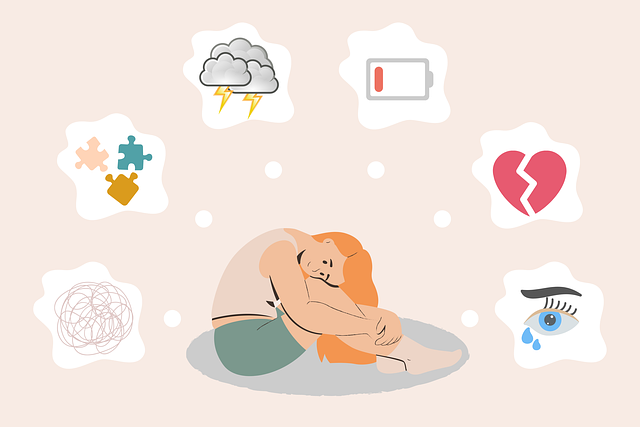Lakewood Young Adults Therapy offers a comprehensive, holistic approach to mood regulation and emotional well-being for young adults. Through self-awareness exercises, Compassion Cultivation Practices, Mindfulness Meditation, Cognitive Behavioral Techniques (CBT), and group therapy, they empower individuals to manage complex emotions, build resilience, and develop effective coping strategies. Their unique program combines mental, physical, and social aspects of well-being, promotes cultural sensitivity, reduces stigma, and fosters positive self-esteem, providing tools for navigating life's stressors and advocating for mental health within policy frameworks.
Mood regulation is a vital skill, especially for young adults navigating life’s challenges. In this article, we explore various strategies to achieve emotional balance. From understanding the fundamentals of mood regulation to adopting holistic approaches like Lakewood Young Adults Therapy, cognitive behavioral techniques, mindfulness practices, and building resilience, each section offers practical insights. Discover how these methods can empower you to manage moods effectively and foster long-term emotional stability.
- Understanding Mood Regulation: Unraveling Emotional Balance
- Lakewood Young Adults Therapy: A Holistic Approach to Mood Management
- Cognitive Behavioral Techniques for Effective Mood Regulation
- Mindfulness and Meditation Practices for Calming the Mind
- Building Resilience: Strategies for Long-Term Mood Stability
Understanding Mood Regulation: Unraveling Emotional Balance

Understanding Mood Regulation is a pivotal step towards achieving emotional balance and overall well-being. It involves recognizing and managing one’s feelings, ensuring they align with life’s demands. For many, navigating these waters can be challenging, especially when dealing with complex emotions or mental health concerns. This is where Lakewood Young Adults Therapy steps in, offering guidance and support tailored to individual needs.
The process often begins with self-awareness—identifying triggers, patterns, and the underlying causes of emotional shifts. Techniques like Compassion Cultivation Practices and Mindfulness Meditation play a significant role here. Developing a Self-Care Routine for Better Mental Health becomes easier once individuals grasp their emotional responses. These practices encourage mindfulness, helping one to observe thoughts and emotions without judgment, fostering a sense of stability and resilience in the face of life’s ups and downs.
Lakewood Young Adults Therapy: A Holistic Approach to Mood Management

Lakewood Young Adults Therapy offers a comprehensive, holistic approach to mood management tailored for young adults navigating life’s challenges. Unlike traditional therapy models that often focus on individual symptoms, this program recognizes the interconnectedness of mental, physical, and social well-being. By addressing these dimensions holistically, Lakewood Young Adults Therapy empowers individuals to develop effective coping strategies, build resilience, and foster a positive sense of self.
The program incorporates evidence-based practices alongside innovative approaches, reflecting the latest advancements in mental health research. With an emphasis on cultural sensitivity and stigma reduction efforts, Lakewood Young Adults Therapy creates a safe, supportive environment where young adults can explore their emotions openly. Through group therapy sessions, mindfulness workshops, and individualized support, participants gain valuable tools to navigate life’s stressors, manage symptoms of mental illness, and advocate for their well-being within the broader context of Mental Health Policy Analysis and Advocacy.
Cognitive Behavioral Techniques for Effective Mood Regulation

Cognitive Behavioral Techniques (CBT) offer a powerful set of tools for young adults seeking effective mood regulation strategies, particularly through Lakewood Young Adults Therapy. CBT focuses on identifying and changing negative thought patterns that contribute to low moods or emotional distress. By challenging these distorted thoughts, individuals can gain a more balanced perspective, leading to improved overall well-being.
This approach encourages active participation in one’s mental health management. It involves learning specific communication strategies, such as assertiveness training, which can help express emotions effectively and foster empathy from others. By combining CBT with empathy-building techniques, individuals can navigate challenging situations more constructively, reducing the risk of burnout. Additionally, these methods promote better coping mechanisms, enabling young adults to manage their moods proactively and maintain a sense of equilibrium in their daily lives.
Mindfulness and Meditation Practices for Calming the Mind

In today’s fast-paced world, mindfulness and meditation practices have emerged as powerful tools for calming the mind and regulating moods. Lakewood Young Adults Therapy recognizes the importance of these techniques in helping individuals manage stress reduction methods effectively. By focusing on the present moment, mindfulness encourages a shift from negative thinking to positive thinking, fostering emotional balance. This simple yet profound practice has been shown to enhance overall well-being and resilience, making it an essential component in crisis intervention guidance.
Meditation, as a complementary practice, allows individuals to explore their thoughts without judgment. Through regular meditation sessions, one can learn to observe their emotions and react to them more thoughtfully, rather than being controlled by impulsive reactions. These practices are accessible to everyone and can be easily incorporated into daily routines, providing an effective way to navigate life’s challenges and promote mental health, as supported by Lakewood Young Adults Therapy.
Building Resilience: Strategies for Long-Term Mood Stability

Building resilience is a key component of achieving long-term mood stability, especially for young adults navigating life’s challenges. At Lakewood Young Adults Therapy, we emphasize strategies that empower individuals to manage their emotional well-being effectively. Developing inner strength involves learning to recognize and accept one’s emotions, rather than suppressing them. This process starts with self-awareness exercises and cultivating mindfulness through practices like meditation. By integrating these techniques into daily routines, individuals can enhance their ability to navigate stressful situations, fostering a sense of calm and resilience.
Additionally, prioritizing burnout prevention is vital for maintaining mood stability. Young adults often face high pressures from academics, careers, and social expectations. Recognizing the signs of exhaustion and implementing healthy boundaries are essential steps in preventing burnout. Encouraging open communication and teaching stress management techniques, Lakewood Young Adults Therapy guides individuals towards sustainable self-care practices. Through these holistic approaches, we support the development of a robust emotional foundation, enabling young adults to thrive and maintain positive moods over time.
Mood regulation is a multifaceted skill, and employing various strategies can significantly enhance emotional well-being. From understanding the core concepts of emotional balance to adopting proven techniques like cognitive behavioral therapy and mindfulness practices, individuals now have an array of tools at their disposal. Additionally, building resilience acts as a cornerstone for long-term mood stability. For young adults seeking comprehensive support, Lakewood Young Adults Therapy offers a holistic approach, addressing the unique challenges they face. By integrating these strategies into daily life, individuals can better navigate emotional landscapes and foster a more balanced and fulfilling existence.














